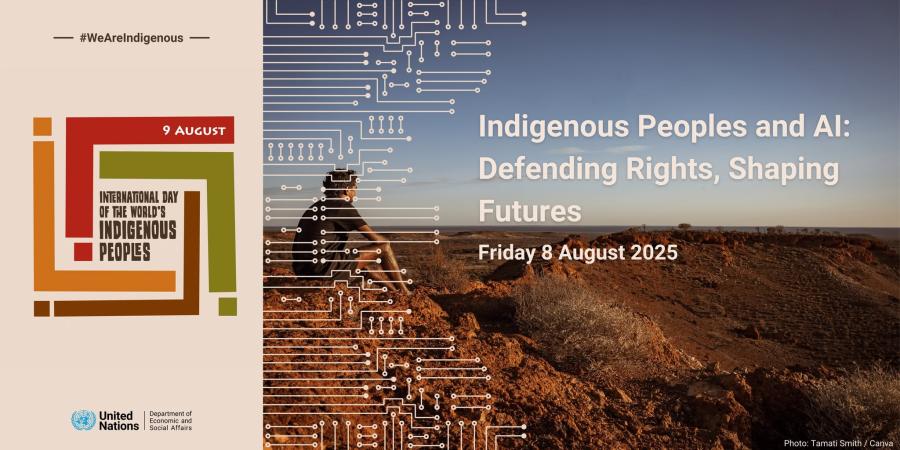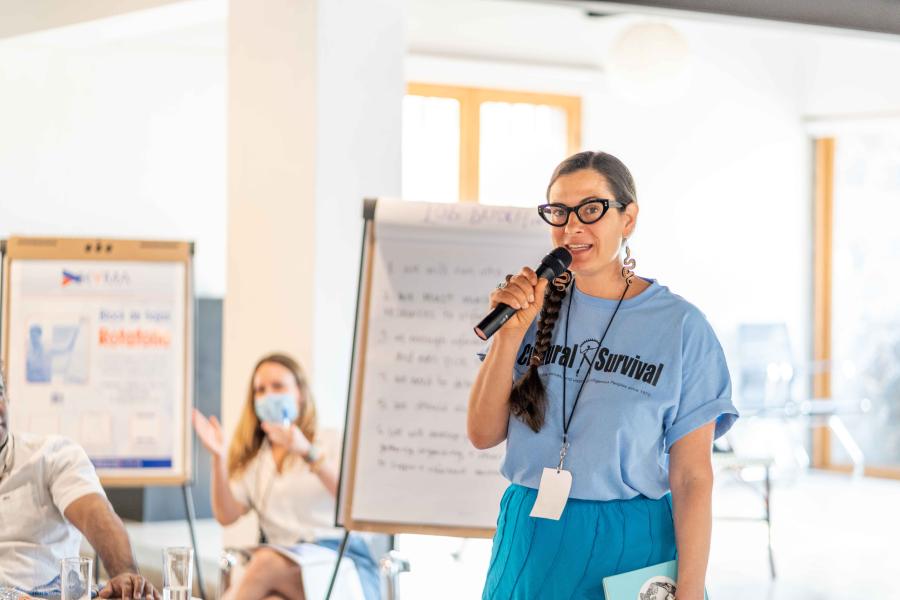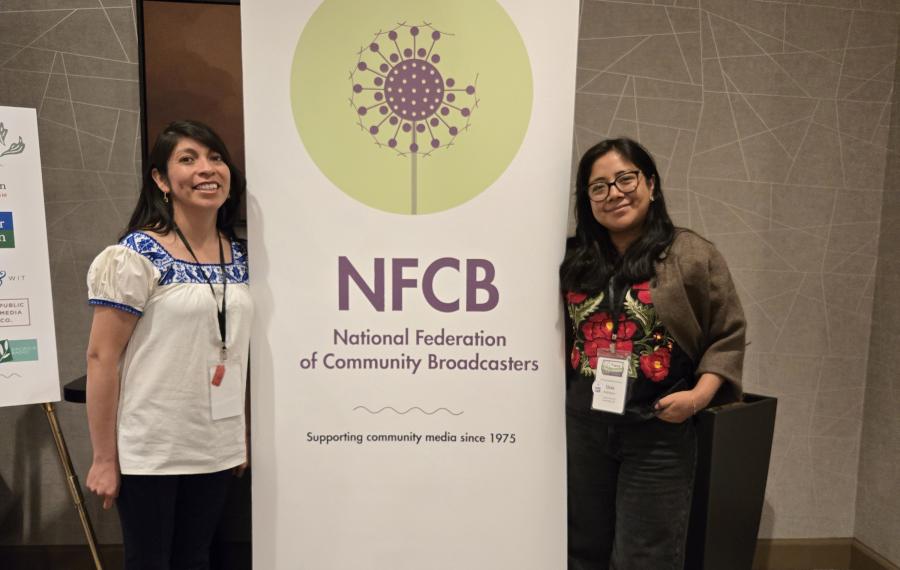International Decade of the World's Indigenous Peoples: The Commission on. Human Rights
The following declaration was adopted without vote by the United Nations General Assembly on March 4, 1994:
Guided by the purpose and principles enshrined in the Charter of the United Nations, the Universal Declaration of Human Rights and the International Covenants on Human Rights.
Bearing in mind that one of the purposes of the United Nations, as set forth in its Charter, is the achievement of international cooperation in solving international problems of an economic, social, cultural or humanitarian character and in promoting and encouraging respect for human rights and for fundamental freedoms for all without distinction as to race, sex, language or religion.
Recalling General Assembly resolution 42/171 of 11 December 1987 and Economic and Social Council resolution 1988/63 of 27 July 1988 and its annex, related to guidelines for international decades,
Recalling also General Assembly resolution 45/164 of 10 December 1990, which proclaimed 1992 as the International Year of the World's Indigenous People, with a view to strengthening international cooperation for the solution of problems faced by indigenous people in the areas, inter alias, of human rights, the environment, development, education and health,
Acknowledging the significance of the Year in raising international awareness of the contribution of, and problems faced by, indigenous people throughout the world, and aware of the need to build on the results and lessons of the Year.
Recognizing the importance of consulting and cooperating with indigenous people, the need for financial support from the international community, including support from within the United Nations system and the specialized agencies, the need for a strategic planning framework and the need for adequate coordination and communication channels.
Expressing its appreciation of the work undertaken by the coordinator of the Year, the Centre for Human Rights, the International Labour Organization, the Goodwill Ambassador, Ms. Rigoberta Menchu, and the Working Group on Indigenous populations of the sub-commission on Prevention of Discrimination and Protection of Minorities.
Recognizing the value and diversity of the cultures and the forms of social organization of the world's indigenous people.
Welcoming the report of the United Nations Conference on Environment and Development, in which the vital role of indigenous people and their communities in the interrelationship between the natural environment and its sustainable development is recognized, including their holistic traditions.
Noting the recommendations included in the Vienna Declaration and Programme of Action adopted by the World Conference on Human Rights to proclaim an international decade of the world's indigenous people, including action oriented programmes to be decided upon in partnership with indigenous people.
Noting further the decision of the General Assembly that, beginning in the first year of the Decade, one day of every year shall be observed as the International Day of Indigenous People.
1. Welcomes the decision of the General Assembly to proclaim the International Decade of the World's Indigenous People, commencing on 10 December 1994;
2. Welcomes also the decision of the General Assembly that the goal of the Decade should be the strengthening of international cooperation for the solution of problems faced by indigenous people in such areas as human rights, the environment, development, education and health;
3. Recognizes the importance of developing partnerships based on mutual respect and understanding with indigenous people in striving to achieve cooperative action to address those issues of concern to indigenous people;
4. Notes that the period from 1 January to 9 December 1994 is to be set aside for planning for the Decade in partnership with indigenous people and emphasizes the need for careful planning full collaboration and consultation with indigenous people in all aspects of preparation and planning for, and implementation of, activities during the Decade;
5. Invites the Working Group on Indigenous Populations to propose at its next session an appropriate date for one day of every year to be observed as the International Day of Indigenous People, following consultations with indigenous representatives;
6. Requests the Assistant Secretary-General for Human Rights as the Coordinator of the Decade to coordinate the international programme of activities for the Decade in full collaboration and consultation with Governments, competent bodies, regional organizations, the International Labour Organization and other specialized agencies of the United Nations, and indigenous and non-governmental organizations;
7. Also requests the Assistant Secretary-General for Human Rights, bearing in mind the contribution that indigenous people can make to establish a unit within the Centre for Human Rights to support its activities related to indigenous peoples and in particular to plan, coordinate and implement activities for the Decade;
8. Further requests the Secretary-General to make available adequate human and financial resources from within existing resources to enable the unit in the Centre for Human Rights to carry out full range of its tasks associated with the planning, coordination and implementation of activities for the Decade, including documentation, communication and data processing needs;
9. Urges United Nations bodies and specialized agencies to designate focal points for coordination with the Centre for Human Rights of activities related to the Decade;
10. Encourages Governments to establish national committees or other mechanisms involving indigenous people to ensure that objectives and activities for the Decade are planned and implemented on the basis of full partnership with indigenous people;
11. Requests specialized agencies, regional commissions and other organizations of the United Nations system to develop with Governments in partnership with indigenous people how they can contribute to the success of the Decade, and to transmit their recommendations to the Coordinator and to the Economic and Social Council;
12. Appeals to the specialized agencies, regional commissions, financial and development institutions and other relevant organizations of the United Nations system to increase their efforts to take into special account the needs of indigenous people in developing evaluation mechanisms, budgeting and programming, including through an examination of how existing programmes and resources might be utilized to benefit indigenous people more effectively and through exploration of ways in which indigenous perspectives and activities can be included or enhanced;
13. Invites indigenous organizations and other interested non-governmental organizations to consider the contributions they can make to the success of the Decade through specific objectives, programmes and activities, with a view to presenting them to the Working Group on Indigenous Populations;
14. Requests that the meeting to be convened in accordance with General Assembly resolution 46/128, with full participation of indigenous people, review the International Year of the World's Indigenous People and also consider preparations for the Decade, particularly with regard to the elaboration of a detailed plan of action, including an evaluation mechanism based on measurable criteria and a suggested funding plan for the Decade and that the meeting report to the next session of the Working Group on Indigenous Populations;
15. Requests the Working Group on Indigenous Populations to identify possible programmes, projects and other activities in connection with the Decade and to submit them through the Sub-Commission on Prevention of Discrimination and Protection of Minorities to the Commission on Human Rights at its fifty-first session;
16. Requests the Secretary-General to establish a Voluntary Fund for the Decade, and authorizes him to seek, accept and administer voluntary contributions from Governments, intergovernmental and non-governmental organizations and other private institutions and individuals for the purpose of funding projects and programmes during the Decade;
17. Urges Governments and intergovernmental organizations and invites indigenous organizations, non-governmental organizations and other private institutions and individuals to contribute to the Voluntary Fund for the Decade to be established by the Secretary-General;
18. Invites Governments, competent United Nations bodies and specialized agencies and other intergovernmental institutions, including financial institutions, to consider providing additional resources to finance the employment or placement of staff, including indigenous staff, in the unit in the Centre for Human Rights, bearing in mind the need for equitable geographical balance;
19. Requests the Secretary-General to give all the assistance necessary to ensure the success of the Decade;
20. Also requests the Secretary-General to submit a preliminary report to the General Assembly at its forty-ninth session and a further report at its fiftieth session on a comprehensive programme of activities for the Decade;
21. Decides to consider the subject of the Decade at its fifty-first session.
Article copyright Cultural Survival, Inc.



